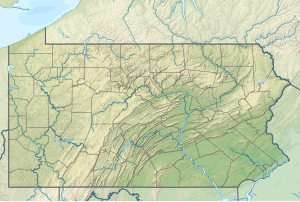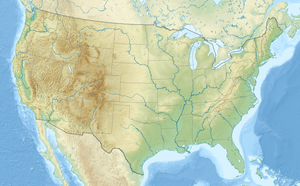Bear Run
| Bear Run Tributary to Youghiogheny River | |
|---|---|
 Bear Run beneath Frank Lloyd Wright's Fallingwater | |
| Location | |
| Country | United States |
| State | Pennsylvania |
| County | Fayette |
| Physical characteristics | |
| Source | Fulton Run divide |
| • location | about 3 miles northeast of Kaufmann, Pennsylvania[2] |
| • coordinates | 39°55′12″N 079°25′02″W / 39.92000°N 79.41722°W[1] |
| • elevation | 2,370 ft (720 m)[2] |
| Mouth | Youghiogheny River |
• location | about 0.25 miles west of Kaufmann, Pennsylvania[3] |
• coordinates | 39°54′11″N 079°29′28″W / 39.90306°N 79.49111°W[1] |
• elevation | 1,000 ft (300 m)[3] |
| Length | 4.56 mi (7.34 km)[4] |
| Basin size | 6.44 square miles (16.7 km2)[5] |
| Discharge | |
| • location | Youghiogheny River |
| • average | 12.94 cu ft/s (0.366 m3/s) at mouth with Youghiogheny River[5] |
| Basin features | |
| Progression | southwest and west[4] |
| River system | Monongahela River |
| Tributaries | |
| • left | unnamed tributaries |
| • right | unnamed tributaries |
| Bridges | PA 381 |
Bear Run is a 5.0-mile-long (8.0 km)[6] tributary of the Youghiogheny River in Fayette County, Pennsylvania, in the United States.
Bear Run is in the Appalachian Mountains and part of the Pittsburgh metropolitan area. The Fallingwater house, designed by architect Frank Lloyd Wright, is located on this stream at the locality known as Mill Run.[7]
Bear Run is inside the Bear Run Nature Reserve, protected by the Western Pennsylvania Conservancy.[8] Bear Run is a designated Pennsylvania Scenic River.[9] The nearest incorporated town is Ohiopyle, once a resort town for affluent Pittsburghers reaching the Ferncliff peninsula via rail. Ohiopyle today is the focal point of tourism in the Laurel Highlands, drawing many of the same visitors as Fallingwater, located a few miles away on PA State Route 381.[10][11]
Course
[edit]Bear Run rises about 3 miles northeast of Kaufmann, Pennsylvania,[2] and then flows southwest and west to join the Youghiogheny River about 0.25 miles west of Kaufmann.[3]
Watershed
[edit]Bear Run drains 6.47 square miles (16.8 km2) of area, receives about 48.1 in/year of precipitation, has a wetness index of 357.26, and is about 89% forested.[5]
Natural history
[edit]Bear Run is the location of Bear Run Watershed BDA. The large forested area of Bear Run, an exceptional value stream, provides habitat for three plant species of special concern.[12]
See also
[edit]References
[edit]- ^ a b "GNIS Detail - Bear Run". geonames.usgs.gov. US Geological Survey. Retrieved 24 November 2020.
- ^ a b c "Get Maps". USGS Topoview. US Geological Survey. Retrieved 24 November 2020.
- ^ a b c "Get Maps". USGS Topoview. US Geological Survey. Retrieved 24 November 2020.
- ^ a b "ArcGIS Web Application". epa.maps.arcgis.com. US EPA. Retrieved 24 November 2020.
- ^ a b c "Bear Run Watershed Report". US EPA Geoviewer. US EPA. Retrieved 24 November 2020.
- ^ U.S. Geological Survey. National Hydrography Dataset high-resolution flowline data. The National Map Archived 2012-03-29 at the Wayback Machine, accessed August 15, 2011
- ^ "Designing Fallingwater". Fallingwater. Retrieved 2019-06-11.
- ^ "Bear Run Nature Reserve". Western Pennsylvania Conservancy. Retrieved 2019-06-11.
- ^ "Pennsylvania Scenic Rivers Program" (PDF).
- ^ "Best White Water Rafting, lodging, Hiking, Biking, Vacation Rentals, Hotels in the Laurel Highlands". Discover Ohiopyle Vacation Guide. Retrieved 2019-06-11.
- ^ Goudy, Olivia (May 15, 2017). "Small Town Life: Ohiopyle a quiet, historic borough within popular state park". heraldstandard.com. Retrieved 2019-06-11.
- ^ "Fayette County Natural Heritage Inventory" (PDF). Pennsylvania Natural Heritage Program. Pennsylvania Natural Heritage Program. Retrieved 24 November 2020.


